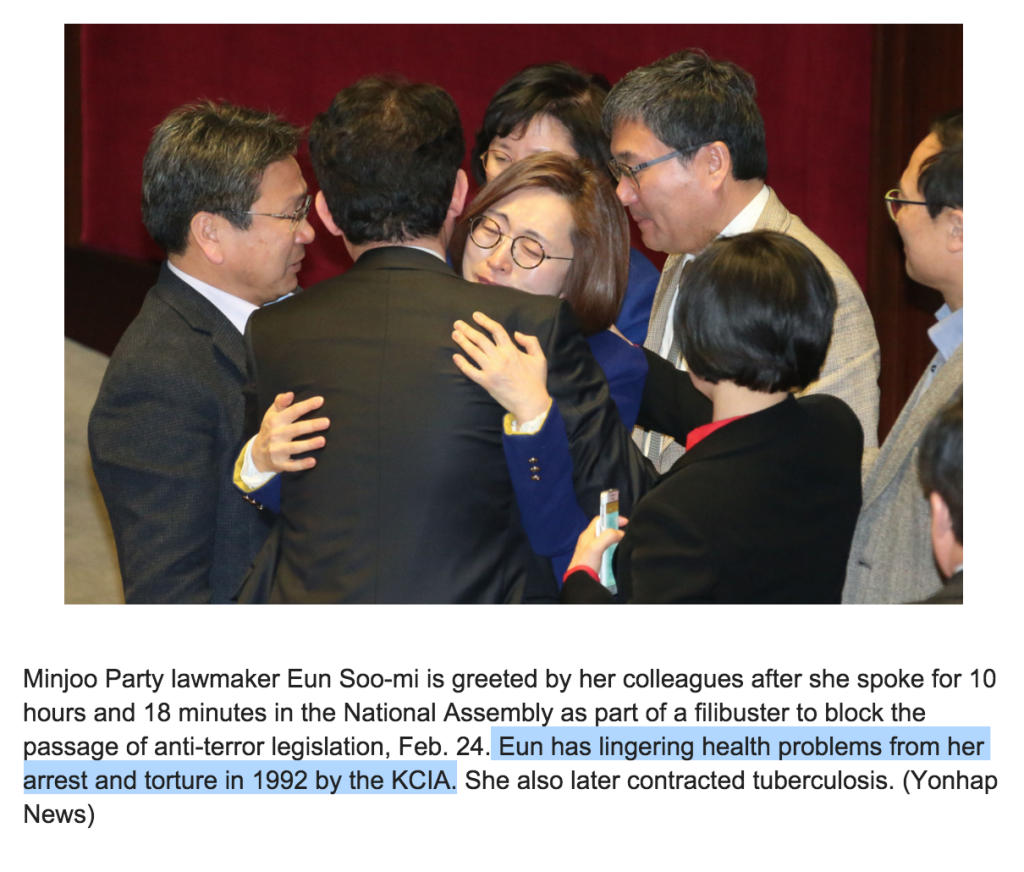Opposition lawmakers in South Korea’s National Assembly are staging a marathon filibuster against a so-called Anti-Terrorist Act being pushed by the Park Geun-Hye government in the wake of North Korea’s latest rocket launch and nuclear test. As the independent Hankyoreh reports:
National Assembly speaker Chung Ui-hwa asserted his authority on Feb. 23 to bring a controversial anti-terror bill to the floor for a vote, describing the recent tensions on the Korean Peninsula provoked by a nuclear test by North Korea as a “national state of emergency corresponding to a war or incident.”
To prevent the legislation from being passed, the opposition parties have launched a filibuster on the floor of the National Assembly, in which it is pointing out problems with the anti-terror bill put forward by the ruling party. This is the first filibuster in South Korea since 1969.
Civic groups also strongly objected to Chung’s decision to bring the bill to the floor, expressing their concern that the NIS would abuse its authority and infringe on civil rights.
On Tuesday evening, Chung Ui-hwa called a session of the National Assembly and asserted his authority to bring the Anti-Terror Act for Protection of the People and Public Safety, a bill submitted by the Saenuri Party (NFP), to the floor. Chung defined the current situation as “a public safety emergency” and said that “the anti-terror bill cannot be put off any longer.”
Anybody concerned with civil liberties and government surveillance should pay attention to this draconian law (scroll down for a cartoon, published today, that illustrates how it will work, with the man in the suit representing South Korean intelligence).
Simone Chun, a colleague of mine at the Korea Policy Institute, has analyzed the bill and its implications. Here is her dispatch, published with her permission.
Making South Korea into a National Security State
By Simone Chun
The so-called Anti-Terrorist Act will give unprecedented and extraordinary power of illegal surveillance of Korean citizens (both domestic and foreign), political leaders and private companies to South Korea’s National Intelligence Service.
The NIS is South Korea’s top spy agency and the successor to the Korean CIA, which had a history of gruesome torture and human rights violations, and buttressed South Korea’s authoritarian regimes from the 1960s to the early 1990s.
This bill provides NIS with:
- The power to investigate citizen without appropriate legal processes
- The power to access financial information, electronic transactions, and communications
- The power to eavesdrop and wiretap
- The power to use the military to end protests, if necessary
- The power to impose prison sentence on citizens without any due process
- The power not to keep its budget secret
Most importantly, according to the bill, the head of the NIS, not the President, will have the ultimate power and authority to enforce the laws, transforming South Korea into a National Intelligence State. That is unconstitutional.
An update on the filibuster so far:
- Kim Kwang-jin had spoken more than 5 hours and 30 minutes.
- Kim Kwang-jin had spoken almost 2 hours.
- Un Soo-mee had spoken for 10 hours and 30 minutes. Representative Un mentioned her own experience of being tortured 20 years ago by the Korean CIA.
Outside the National Assembly, citizens are holding their own filibuster in solidarity with the lawmakers inside the parliamentary buildings.
As you know, Korea is one of the safest countries in the world, and is free of any history of terrorism. Many of you have visited or lived there. In fact, most acts of “terror” have been committed by state authorities, i.e., the NIS. Although South and North Korea are in a state of war with only an armistice, that conflict is between states and is not “terrorism” as generally understood in the world.
Worse, South Korea already has a strict and rigid National Security Law that severely restricts and limits our citizens’ freedom and liberty. For that reason, critics argue that the new law is just the latest attempt by President Park Geun-hye and her ruling Saenuri Party, with the help of the National Intelligence Service, to secure a long-term seizure of power.
Elections for the National Assembly are scheduled in April 2016, and for President in December 2017. President Park and the ruling party are using the latest crisis with North Korea to manufacture an unnecessary crisis that tarnishes Korea’s international branding (democratic, orderly, safe, stable and sophisticated civic culture). It disguises President Park’s failed economic policies and dysfunctional government. Most importantly, it hurts Korea’s already depressed economy which than ever, requires the confidence of investors and consumers.
South Korean citizens’ groups opposed to the bill make the following requests:
- Help defend Korea’s democracy–the safest insurance against all threats.
- Stop politicizing the serious issue of terrorism.
- Support Korean lawmakers’ and citizens’ courageous struggle to defend democracy.
- No democracy, no individual liberty and freedom means no security and no peace.
International media’s attention to this historic and epic struggle to defend Korea’s democracy is urgently needed!
For background, please read the following:
The New York Times on South Korea’s “invasion of privacy”
The New York Times on “how South Korea is targeting dissent”


